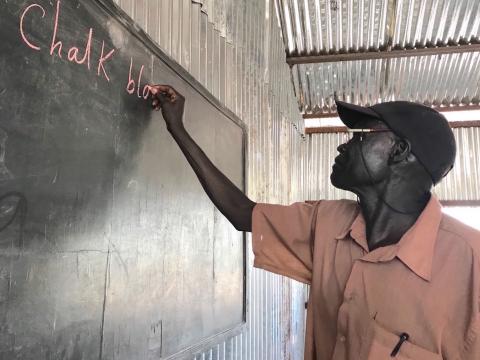Meet a literacy champion: South Sudanese father starts school in the camp that now serves over 300 children

By Lisi Emmanuel Alex, Communications Officer
Kenyi Ali Duco, now 49, is a South Sudanese who was working as an aid monitor in Khartoum helping returnees go back to South Sudan from Sudan after the independence was declared on July 2011. At that time, the expectations of the people were very high and everyone who once fled for safety in other countries wanted to return home.
Many have been away for decades and were excited to be part of the new era. After a time helping others, Kenyi decided to join the throng of returnees.
When fighting ensued in 2013, some of these returnees got stranded in the outskirts of Renk County. They temporarily stayed in the area hoping to proceed with the journey once everything calmed down. Some of them who traveled by boat from Kosti, one of Sudan’s major cities with a port close to South Sudan, waited in Renk for their shipped properties.
Six-year old Monyual is happy he is able to learn and play football with his classmates in school.
In 2014, many children of the returnees were just roaming around the camp for the displaced. They had nothing to do and many of the families could not afford to send them to school. Kenyi, who was then working for another aid agency, decided to quit his job, use his separation pay and started a primary school called Payuer Primary School. He used one of the oldest and unused structures in the area.
“I just thought about the future of the children in the camp and came up with a decision to leave work and start a school. I registered children from five years and above and started primary 1, 2 and 3 with a total of 144 learners,” Kenyi shares. He said he was unable to provide textbooks and school materials but he was optimistic that people will come and help the children.
He used the three dilapidated rooms of the building for the classes and his office was under a tree. It was difficult for him to control all the children in three different classrooms because he was alone. “I have to lock the rooms when I move to the other classroom to keep the children from straying outside and going somewhere,” he recalls.
A hero without even knowing it. Kenyi started with makeshift huts as classrooms. A tree nearby served as his office.
In 2017, World Vision did an assessment and started supporting the school. “I am very grateful to World Vision because they did exactly what we have discussed. Two classrooms were constructed, the scholastic materials and books were provided. World Vision also gave incentives to the teachers and sent them for training,” he adds.
A father of eight children, Kenyi sends all of them to school in Juba. He says, “Education is key to everything in life. It can bring development, change the mindset and can encourage co-existence among tribes and people with different beliefs.” Kenyi said that in the early 70s, they fled to Uganda as refugees and that was where he studied as a child.
He reached up to senior four but could not proceed due to financial difficulties. He decided to go to Khartoum and got married. Despite what he went through, he still dreams to study and learn more.
Absenteeism was his biggest challenge. When the children feel hungry, they go home and never come back. This problem was addressed when World Vision started the school-feeding program through the support of the World Food Programme (WFP). Enrolment rose to 306 with an encouraging class attendance.
This year the school has added grade six (primary six class) for both children from the camp and the host community. “I expect for the school population to increase with the introduction of the school feeding program, “ Kenyi says adding that his dream is to be able to go for further studies.
World Vision supports 26 schools in Renk and Manyo Counties with a total of 13,044 children from 3 to 18 years old. Among these children in Payuer is Monyual, 6 years old. He said he likes the school because it provides them food and protects them from heavy rains. “I like playing football after classes and I always score goals” he adds.
World Vision’s project coordinator Emmanuel Wani said the school still faces a lot of challenges. “Most of the teachers are volunteers and we give them government-standardized stipends. If they find better-paying jobs, they can leave anytime,” he says.
The 2-year project, which ends on July 2020, is funded by UNICEF and includes providing incentives to voluntary teachers and facilitators, rehabilitation and construction of classroom structures, distribution of education supplies to the learners, trainings of teachers and stakeholders and conduct of back-to-learning campaign.
The Payuer Primary School buildings may look desolate but a lot of dreams are rising from them.



